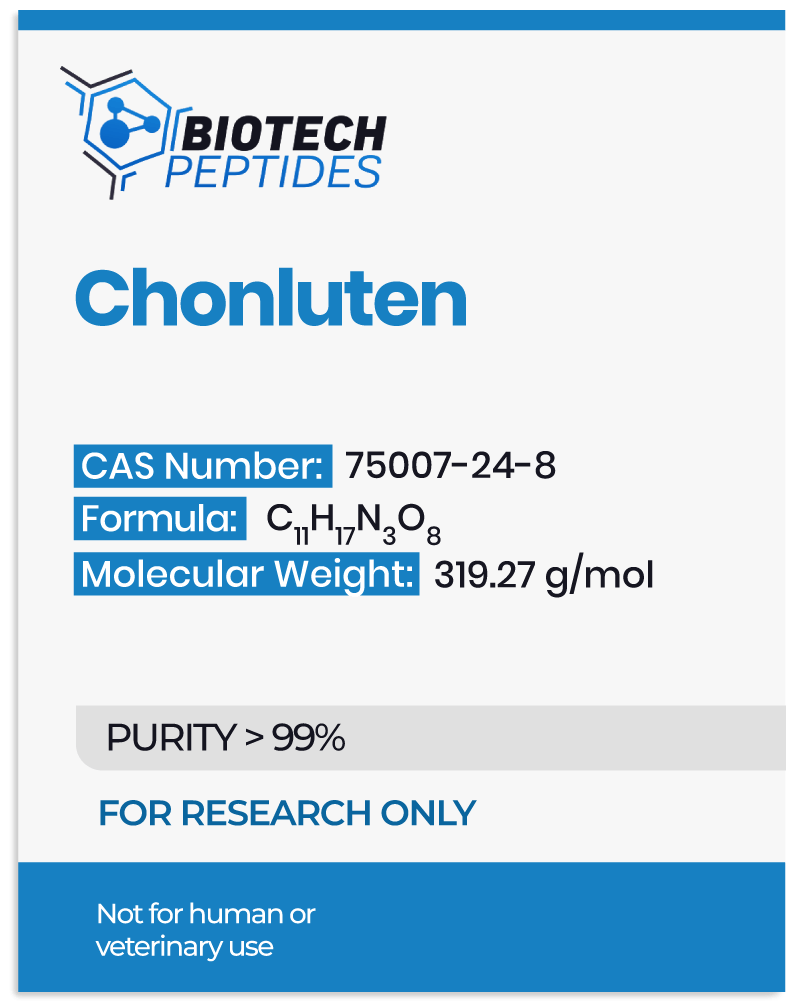Chonluten peptide has been researched as a potential geroprotective agent that may slow cell aging. It has also been suggested to hold anti-inflammatory characteristics in the lungs, possibly modulating mucosal function in chronic obstructive pulmonary disease (COPD).
Tripeptides in Bioregulatory Processes
Several small di-, tri-, and tetrapeptides have been suggested in animal studies to inhibit the spontaneous development of tumors by up to 40%.[2] When combined with the rate at which biomarkers decline, scientists believe these tripeptides may potentially control gene expression and cellular processes such as apoptosis.
Studies have suggested that short peptides may control aspects of gene expression and epigenetic DNA methylation.[3] These findings indicate that a single short peptide may modulate genes by edging the cytoplasmic (cell) and nuclear membranes to bind to DNA at the promoter, suppressor, and other DNA control turfs using a simple docking method.
Chonluten Peptide and Gene Expression in the Lungs
Chonluten peptide may potentially modify DNA expression to stabilize mucosa in the bronchi. The mucosa of the bronchi is considered to act as a barrier between external threats, cardiovascular inner chambers, and the rest of the organisms’ systems. Different inflammatory conditions, such as asthma or chronic obstructive pulmonary disease (COPD), may alter and damage the mucosa and cardiovascular chambers, resulting in changes in mucus secretion and extracellular matrix structure.
Chonluten’s mechanism of action has been hypothesized by researchers to be mediated by genes such as c-Fos, the shock protein gene HSP70, SOD, COX-2, TNF-alpha, and antioxidant system genes. The anti-inflammatory action of gene regulation, such as c-Fos, are of interest. The c-Fos protein is a proto-oncogene considered to be activated by depolarization in some neurons. As it may be identified using immunohistochemical techniques, its expression might be a marker for neuronal activity throughout the neuraxis due to peripheral stimulation. The c-Fos protein, activated in response to hypoxia and cellular damage, may be a regulator of cell proliferation, survival, and differentiation. Given that the protein’s local impact might benefit angiogenesis and cell proliferation following injury, widespread protein expression may potentially cause bronchial mucosa thickening and even cancer development. As a result, one of the possible pathophysiological changes in COPD and asthma is the ability to control c-Fos activities and expression.
Chonluten Peptide and the Gastrointestinal Tract
Chonluten’s potential impact on the gastrointestinal tract (GI tract) may be nearly identical to those in the lungs. According to research, the peptide might reduce inflammation and vascular changes in the GI tract due to potential prevalence of inflammatory diseases such as ulcerative colitis and Crohn’s disease.[4] According to Khavinson et al. “The development of gastric ulcer is associated with morphological and molecular changes resulting from modulation of the synthesis of antioxidant and anti-inflammatory proteins. Peptide T-34 normalizes the synthesis of these proteins by regulating the expression of the corresponding genes.” Chonluten peptide research is ongoing.
Disclaimer: The products mentioned are not intended for human or animal consumption. Research chemicals are intended solely for laboratory experimentation and/or in-vitro testing. Bodily introduction of any sort is strictly prohibited by law. All purchases are limited to licensed researchers and/or qualified professionals. All information shared in this article is for educational purposes only.
References
- Avolio F, Martinotti S, Khavinson VK, Esposito JE, Giambuzzi G, Marino A, Mironova E, Pulcini R, Robuffo I, Bologna G, Simeone P, Lanuti P, Guarnieri S, Trofimova S, Procopio AD, Toniato E. Peptides Regulating Proliferative Activity and Inflammatory Pathways in the Monocyte/Macrophage THP-1 Cell Line. Int J Mol Sci. 2022 Mar 25;23(7):3607. doi: 10.3390/ijms23073607. PMID: 35408963; PMCID: PMC8999041.
- Anisimov, V. N. “Evolution of concepts in gerontology and physiological mechanisms of aging.” Molekulyarnye i fiziologicheskie mekhanizmy stareniya (Molecular and Physiological Mechanisms of Aging) Nauka, St Petersburg vol 1, parts 1–3, 49–95, 269–378. 2008.
- Khavinson VK, Lin’kova NS, Tarnovskaya SI. Short Peptides Regulate Gene Expression. Bull Exp Biol Med. 2016 Dec;162(2):288-292. doi: 10.1007/s10517-016-3596-7. Epub 2016 Dec 1. PMID: 27909961.
- Khavinson VKh, Lin’kova NS, Dudkov AV, Polyakova VO, Kvetnoi IM. Peptidergic regulation of expression of genes encoding antioxidant and anti-inflammatory proteins. Bull Exp Biol Med. 2012 Mar;152(5):615-8. English, Russian. doi: 10.1007/s10517-012-1590-2. PMID: 22803148.
- Khavinson, V., Linkova, N., Dyatlova, A., Kuznik, B., & Umnov, R. (2020). Peptides: Prospects for Use in the Treatment of COVID-19. Molecules (Basel, Switzerland), 25(19), 4389. https://doi.org/10.3390/molecules25194389







